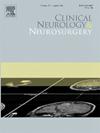依达拉奉联合复方脑苷治疗老年颈动脉斑块性脑梗死的疗效及预后
IF 1.6
4区 医学
Q3 CLINICAL NEUROLOGY
引用次数: 0
摘要
目的评价老年颈动脉斑块型大面积脑梗死(CPMCI)患者未接受再灌注治疗的临床疗效、远期预后及认知功能恢复情况。方法本研究采用多中心、回顾性、单臂设计,选取2021年1月至2023年12月接受依达拉奉、右美沙芬及复方脑苷联合治疗的老年CPMCI患者184例。主要结局指标包括改良Rankin量表(mRS)评分和美国国立卫生研究院卒中量表(NIHSS)评分。次要观察指标包括Barthel指数、蒙特利尔认知评估量表(MoCA)评分、卒中复发率、生存率和并发症。随访时间1年。结果治疗6个月后,54.9 %患者实现功能独立(mRS≤2),定义为mRS评分≤ 2。NIHSS评分从基线时的平均16.52 ± 4.23降至6个月时的5.78 ± 3.19 (P <; 0.001)。此外,Barthel指数和MoCA评分均有显著改善(P <; 0.001)。1年卒中复发率为13.59 %,1年生存率为77.7 %。治疗相关并发症以轻中度为主,包括吸入性肺炎(10.87 %)和尿路感染(5.97 %),总发生率为16.85 %。结论依达拉奉、右旋糖酐、复合脑苷联合治疗老年CPMCI患者无需再灌注治疗,临床效果显著,可改善其功能独立性、神经功能、日常生活活动能力和认知功能,安全性可接受。本文章由计算机程序翻译,如有差异,请以英文原文为准。
Edaravone plus compound cerebroside in elderly patients with carotid plaque cerebral infarction: Efficacy and prognosis
Objective
To evaluate the clinical efficacy, long-term prognosis and recovery of cognitive function of the elderly patients with carotid plaque massive cerebral infarction (CPMCI) who did not receive reperfusion therapy.
Methods
A multi-center, retrospective, single-arm design was adopted in this study, and 184 elderly patients with CPMCI who received the combined treatment of Edaravone, dextromethorphan and compound cerebroside from January 2021 to December 2023 were included. Main outcome measures include modified Rankin scale (mRS) score and National Institutes of Health Stroke Scale (NIHSS) score. Secondary outcome measures included Barthel index, Montreal Cognitive Assessment Scale (MoCA) score, recurrent stroke rate, survival rate and complications. The follow-up time was 1 year.
Results
After 6 months of treatment, 54.9 % patients achieved functional independence (mRS≤2), defined as a Modified Rankin Scale (mRS) score of ≤ 2. The NIHSS score significantly decreased from a mean of 16.52 ± 4.23 at baseline to 5.78 ± 3.19 at six months (P < 0.001). Additionally, both the Barthel Index and MoCA scores showed significant improvements (P < 0.001). The one-year recurrent stroke rate was 13.59 %, while the one-year survival rate was 77.7 %. Treatment-related complications were primarily mild to moderate, including aspiration pneumonia (10.87 %) and urinary tract infections (5.97 %), resulting in a total incidence of 16.85 %.
Conclusion
Edaravone, dextran and compound cerebroside combination therapy has a significant clinical effect on elderly CPMCI patients without reperfusion therapy, which can improve their functional independence, neurological function, activities of daily living and cognitive function, with acceptable safety.
求助全文
通过发布文献求助,成功后即可免费获取论文全文。
去求助
来源期刊

Clinical Neurology and Neurosurgery
医学-临床神经学
CiteScore
3.70
自引率
5.30%
发文量
358
审稿时长
46 days
期刊介绍:
Clinical Neurology and Neurosurgery is devoted to publishing papers and reports on the clinical aspects of neurology and neurosurgery. It is an international forum for papers of high scientific standard that are of interest to Neurologists and Neurosurgeons world-wide.
 求助内容:
求助内容: 应助结果提醒方式:
应助结果提醒方式:


